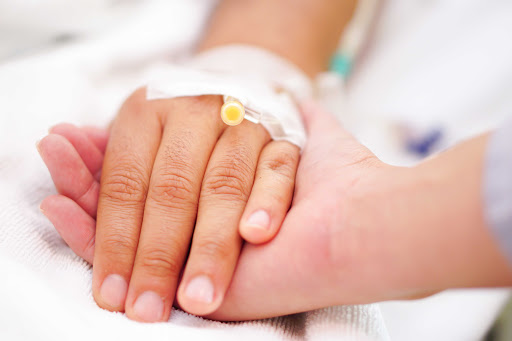Story by Laura Lagana
“Show kindness toward another in their troubles, and courage in your own.”
Princess Diana
The world is filled with beauty, joy and wonder, along with ugliness, hatred and violence. In my youth, I always believed that things were either black or white; people were either good or bad; that is, until I grew up.
When I became a nurse I saw many different sides of life, witnessed things that defied explanation and learned life isn’t always fair. As I became a wife and mother, I discovered the gray zone that lies between the black and the white. I also discovered that there are no guarantees in life. You give it your best shot and hope that it’s good enough. With this same attitude my husband and I approached parenthood. We both agreed that we would do our best to raise our two sons to be honest, law-abiding citizens.
I viewed both parenthood and my part-time position as medical-surgical nurse at one of our local hospitals as a journey into the unknown. Parenthood and nursing always yielded unexpected challenges and sometimes hidden rewards. I faced fear many times during my twenty-year nursing career.
One December morning, I was “pulled” to the Protective Care Unit (PCU). When there was a staffing shortage in the hospital, the nurses would be “pulled” to that particular department that was in need. For some reason, I feared the PCU. I knew the unit was used to isolate patients suffering from infectious diseases, for reverse isolation to protect patients with compromised immune systems, and to house inmates from the local prison who needed treatment.
For whatever reason, my fear remained strong. After morning report, the change-of-shift meeting where patient progress and updates are given, I prepared to care for my assigned patients. Suddenly I was forced to face my worst fear.
I was assigned to take care of a prison inmate — a convict. Suddenly I stopped breathing. I could hardly swallow let alone speak, so I began to review my patients’ charts. I reviewed the inmate’s chart last, foolishly trying to postpone the inevitable. I decided to conceal my fear and meet my patients.
When I met the prisoner he wasn’t at all what I expected. In my mind’s eye I expected to see a large, disheveled, abusive character — instead, I saw a frightened, sickly child who desperately needed help. Jamie had appendicitis and was shackled to the bed, which was customary procedure for inmates. A correctional officer was posted at his bedside around the clock.
Jamie was amazingly frail and only several years older than our own two teenage sons. He tried to find a more comfortable position, despite the shackles. After I introduced myself and pulled up a chair, I began to explain his upcoming surgery to him. I quickly lost my fear, and I was determined to help alleviate his fears by preparing him for the operation.
Despite his obvious pain and discomfort, Jamie was eager to talk to me. As I took his vital signs and began washing his scarred face, he said with a grimace, “You know, you remind me so much of my mother. You could be her sister. You’re so much like my dear, sweet mother. We had such good times. This time of year we’d bring in that huge Christmas tree, and then decorate it. Dad made sure to put that star on the top. Then we’d bake all kinds of cookies with icing and candies. Then, on Christmas morning there’d be hundreds of presents under the tree, and a big fire blazing in the stone fireplace. Oh, those were the good old days,” he said.
When the vomiting returned, Jamie had to stop for a few minutes. After I cleaned him up, he continued to reminisce. “I sure miss those days. And I really miss my six brothers and sisters — three of each you know.”
“I’ll bet you do miss those good times. At least you have wonderful memories,” I replied. I didn’t know what else to say. I couldn’t stop wondering. How does such a nice young man go so wrong? Just what happens to a person? I never asked, because I didn’t want to know — and I didn’t need to know.
I read Jamie’s chart and made a few notes. As I looked over his history and admission notes, I couldn’t believe my eyes. Jamie had been abandoned at birth and had never known a mother or father. He spent his entire twenty-two years going in and out of foster homes and juvenile detention facilities — never knowing his natural parents — never knowing unconditional love.
This time, Jamie was serving real time in prison. I knew he had to have done something serious. I’m glad I didn’t know what it was. I didn’t want to think in terms of black or white, good or bad. I prayed that I could be a good enough mother to my sons so this wouldn’t happen to them — but there are no guarantees.
The time for surgery approached. The orderly pushed the gurney and accompanied me to Jamie’s room. When the gurney and bed were aligned and the officer released Jamie’s shackles, we helped him onto the gurney. As I pulled the sheet over him and placed the green paper cap on his head, Jamie looked at me through glassy eyes, a sign that the preoperative medication had taken effect. I felt the urgency to say something, so I took his hand in mine and said, “When you are released from prison, don’t ever go back — make sure you stay out. Will you do that for me?”
He squeezed my hand and with a dry-mouthed, raspy voice responded, “Thanks Mom… Thanks. I’ll do my best.”
I don’t know if I made much of a difference that day, but I’d like to think so. Jamie, if you are reading this story, I pray to God that you are reading this from the “outside.” I hope you gave it your best shot.





